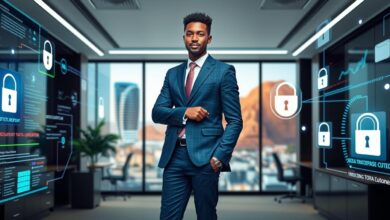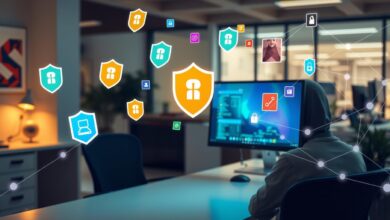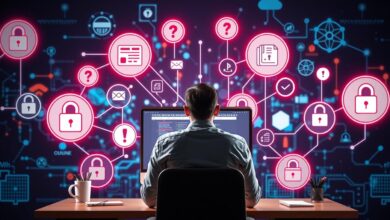Essential Precautions for Safe Internet Banking
Internet banking has changed how we handle money. It’s easy and convenient, but it also comes with risks. Knowing how to stay safe online is key.
By following some important tips, you can keep your personal info and money safe. This includes using strong passwords and watching your account closely.
Banks help by offering extra security like two-factor authentication. It’s important to stay up-to-date with online fraud to protect yourself.
Understanding the Risks of Internet Banking
Internet banking makes managing money easy, but it comes with risks. Cybercriminals look to take advantage of these risks, which can cause big financial losses. Scams like phishing, identity theft, and data breaches are common threats to online transactions.
Reports from Interpol and UK banking regulators show a rise in online fraud. In South Africa, fraud reports have also gone up, highlighting the need to understand internet banking risks. It’s important to double-check who you’re sending money to, especially when it’s across borders.
Keeping your online banking info safe is key. Never share your login details with anyone. Use different passwords for each account to reduce the risk of a breach. Scammers often use urgent messages to trick people, so being cautious is essential.
- Bank transfer scams
- Investment scams
- Remote access scams
- Email or text scams
- Changes to payment details scams
- Romance scams
- Authorised push payment scams
Financial institutions can improve security by following rules like PCI DSS, GDPR, and PSD2. Using two-factor authentication adds an extra layer of protection. Changing your passwords regularly, with a mix of numbers, symbols, and letters, also helps a lot.
Knowing the risks of internet banking is crucial for safe online money management. Using encrypted sites helps protect your data. By staying alert, you can safely use internet banking and avoid many threats.
Importance of Choosing the Right Bank
Choosing the right bank is key to safe internet banking. A good bank offers convenience and strong security features. These protect your financial information.
Look for Two-Factor Authentication
Two-factor authentication (2FA) is a must for online and mobile banking. It adds an extra step, like a text code or app, to keep your account safe. This greatly lowers the chance of someone else getting into your account.
Examine Security Features Offered
When picking a bank, check their security features. Look for 128-bit or 256-bit encryption and 24/7 customer support. These help keep your online transactions safe and secure.
Creating Strong and Secure Passwords
Password security is key for internet banking. It’s important to make strong and secure passwords to keep your online accounts safe. A good password is your first defense against online threats.
Characteristics of a Strong Password
To boost online safety, focus on these password traits:
- Use at least 12 characters or more, increasing complexity.
- Combine uppercase and lowercase letters, numbers, and special characters.
- Avoid easily guessed information such as names, birthdays, or common words.
- Steer clear of patterns on the keyboard, as these can be easily cracked.
- Create unique passwords for each account to minimize risks if one password is compromised.
- Consider using randomly generated passwords for improved security.
Changing Passwords Regularly
Changing passwords often is crucial for internet banking security. Updating them every few months can stop cybercriminals who might get your password. Using password managers like LastPass or 1Password can help keep your passwords safe. This makes it easier to manage complex passwords without having to remember them all.
Tips For Secure Internet Banking Practices
In today’s digital age, it’s crucial to keep your finances safe online. Many people face risks with internet banking. Knowing some practical tips can help keep your account safe. Always make sure to protect your online banking account by following these important suggestions:
- Avoid public Wi-Fi: Public networks are risky, so it’s best to avoid them when banking.
- Type the bank’s URL: Always enter the bank’s website directly to avoid phishing scams.
- Utilize account notifications: Banks send alerts for account activities, helping spot suspicious actions early.
- Change passwords regularly: Updating passwords often helps protect against unauthorized access.
- Use licensed antivirus software: Free software may not protect against new threats. Licensed programs offer better security.
- Disconnect the internet when not in use: This simple step can greatly reduce unauthorized access risks.
- Examine accounts after transactions: Regular checks can help spot any discrepancies and prevent losses.
Following these internet banking safety tips can greatly improve your financial security. Remember, staying alert and cautious is essential for safe online banking.
Safeguarding Your Online Banking Information
To keep your online banking safe, using good strategies is key. One important step is setting up security questions. Pick questions that are hard to guess and not found on social media. This makes it harder for hackers to get into your account.
The Use of Security Questions
When picking security questions, choose answers that are not public. Use abstract references or personal codes that only you know. This makes it tough for hackers to get into your financial accounts.
Importance of Unique Email Passwords
Having unique email passwords is a big help in keeping your info safe. Many banks send password reset links to your email. If your email is hacked, your financial info could be at risk. So, use different passwords for each email account. This, along with good security questions, helps protect your important info.
Recognizing Phishing Attempts
Phishing attempts can cause big financial losses and identity theft. It’s important to know the signs of these scams to stay safe online. Most phishing scams start with suspicious emails that try to trick users into sharing personal info.
Beware of Suspicious Emails
Most phishing attacks start with emails, so be careful with any unexpected messages. Look out for:
- Poor grammar or spelling, which often means it’s not from a real company.
- Urgent requests for sensitive info like passwords or social security numbers.
- Links to unknown websites, which could be dangerous.
Phishing emails are opened by 30% of people, and 76% of companies faced these attacks in 2020. Scammers often pretend to be someone you know, making it hard to spot them. Always check if the email is real before giving out any info.
Safeguarding Information Over the Phone
Phishing isn’t just about emails. Scammers also try to get info over the phone. Real companies will never ask for your full password or PIN. If you get a surprise call:
- Don’t give out personal info unless you’re sure who it is.
- Hang up and call the company back using a number you know is real.
- Tell the authorities about any weird calls.
Staying alert is crucial to protect your financial info. With new phishing tricks like targeted attacks and social media scams, being careful can help stop these scams.
Utilizing Anti-Virus and Security Software
In today’s digital banking world, strong anti-virus and security software are key. They protect personal info from new cyber threats. Using good internet banking security tools helps keep online activities safe.
Anti-virus software for banking fights off malware, Trojans, and keyloggers. These threats aim to steal sensitive data. So, it’s vital to have this software to defend your system.
Keeping Your Software Updated
Keeping security software up to date is crucial. Cybercriminals use old system flaws to get in. By updating, you plug these holes and protect your data.
It’s important to check for updates often. This keeps your online banking safe from threats.
Using Firewalls Effectively
Firewalls add an extra layer of protection for your banking info. They watch traffic and block bad connections. Setting up your firewall right is key to safe online banking.
A good firewall, with other security tools, makes your online banking safer. It lowers the risk of attacks.
Safe Online Banking Measures When Using Public Wi-Fi
Public Wi-Fi is convenient but comes with risks for online banking. Users must be cautious of these dangers. Cybercriminals can easily steal sensitive data when you’re on unsecured networks. It’s vital to protect your personal and financial info.
Risks of Public Wi-Fi
Public Wi-Fi networks pose many threats. Hackers can intercept your data, which is a big concern. In fact, 67% of cybercrimes in online banking happen on public networks.
Malicious actors use ‘man-in-the-middle’ tactics to steal your info quickly. This leaves you open to financial theft. Always check if the network is safe and use protection when accessing sensitive info.
Using a VPN for Security
Using a VPN is a top safe online banking measure. A VPN encrypts your internet connection, hiding your IP address. This keeps your banking info safe from hackers.
Always use a VPN for banking to keep your online privacy. Adding two-factor authentication (2FA) on untrusted networks also boosts security.
Always Logging Out After Transactions
Keeping your banking safe means following key logout practices online. Always log out after you finish any online banking. This step helps prevent session hijacking, which happens if you forget to log out.
It’s also smart to clear your browser cache after each use. This removes data that could be used against you. Don’t save your banking details on your device to keep your info safe.
Features like automatic session timeout are helpful but not enough. Always close your browser after you’re done with banking. These steps help keep your banking safe and protect your money from threats.
Setting Up Notifications for Account Activity
Setting up account activity notifications is key to keeping your online banking safe. These alerts give you updates on your account in real-time. This helps you spot any odd behavior fast.
Banking alerts for security give you peace of mind. They make sure you know what’s happening with your money.
Utilizing Text or Email Alerts
Dream First Bank and others let you choose how you get alerts. You can get texts or emails for things like low balances or big transactions. You can pick how much money you want to be notified about.
This way, you only get alerts for important changes. It helps you deal with any issues quickly.
Monitoring Account Transactions Regularly
It’s important to keep an eye on your transactions. Checking your statements and using security alerts helps you spot fraud fast. This is key to protecting your money.
Many people like to manage their accounts on their phones. It’s easy to get updates and stay on top of things.
Essential Precautions for Safe Internet Banking
Online banking needs careful steps to keep your money safe. It’s important to take action to protect your banking. One key step is to check your account statements often. This helps spot fraud early.
Regularly Review Account Statements
Checking your account statements often is a must. It helps catch any unauthorized transactions. By doing this regularly, you stay on top of your finances and can spot threats quickly.
Taking Immediate Action for Suspicious Activities
If something looks off, act fast. Change your passwords right away and tell your bank. Knowing how to reach your bank’s customer support is key. Being alert helps keep your online banking safe.
Conclusion
Secure online banking practices are key to keeping your internet banking safe. You should use strong, unique passwords and choose reliable banks. Always be on the lookout for security threats.
Regularly update your software and know how to spot phishing scams. Quick action when something seems off is also important. These steps are crucial for safe banking.
Axis Bank says keeping your finances and privacy safe is vital. Safe online banking means not sharing computers and logging off after each use. Using firewalls and antivirus software is also a must.
By following these habits, you can greatly reduce online banking risks. It’s important to stay alert and informed about cyber threats. This way, you help make banking safer for everyone.
Being proactive in your online banking habits is essential. It not only keeps your banking safe but also secures your financial future. By following these best practices, you can safely manage your online banking needs.
FAQ
What are the essential precautions for safe internet banking?
How can I protect my online banking information?
Why is two-factor authentication important?
What should I do if I receive a suspicious email related to my banking?
How do I recognize phishing attempts?
Why is using public Wi-Fi risky for online banking?
What are the best practices for creating strong passwords?
How can I set up notifications for account activity?
What should I do if I notice unauthorized transactions in my account?
Published on: 12 de September de 2024

Bakari Romano
Bakari Romano is a finance and investment expert with a strong background in administration. As a dedicated professional, Bakari is passionate about sharing his knowledge to empower individuals in managing their finances effectively. Driven by this mission, he founded FinancasPro.com, where he provides insightful and practical advice to help people make informed financial decisions. Through his work on the site, Bakari continues to make finance accessible and understandable, bridging the gap between expert knowledge and everyday financial needs.






